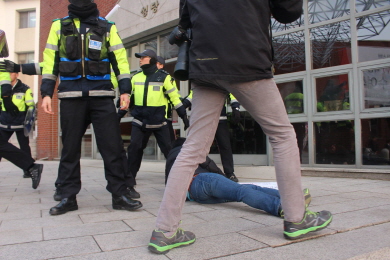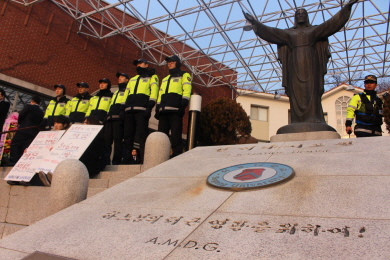

On March 9, a protest letter was signed by 1344 students from 121 universities. This letter argued against the exertion of police authorities over students’ rights to govern themselves and set forth their opinions freely. Around 10 student representatives held a press conference in front of the National Police Agency (NPA) and asked for the police’s release of information on pertinent cases. They also demanded the chief’s promise that such incident shall never recur. Although these students tried to deliver protest letters to the National Police Commissioner General, they were surrounded by the police force and had skirmishes for 20 minutes.
Last Feb. 4, the police entered Sogang University to quell a demonstration organized by students and members of Korean Metal Workers’ Union. The demonstration was held to express opposition against the conferment ceremony of honorary doctorate to Hong Seong-yeol, the CEO of Mario Outlet. The students protested that it is unacceptable for the school to confer honorary degree to someone who has been accused of implementing anti-labor policies. Meanwhile, the school called the police onto the campus to ensure order and safety for the ceremony. It was the first time in 16 years that the police power was exercised within the campus, breaking the unwritten rule that the university at all times must be free of any coercive forces of state authority.
The authorities of Sogang University maintain that asking for the police support was a measure for precaution.
“What do you think we could have done when demonstrators were marching into the school?” asked an official from the Office of Public Affairs of Sogang University. “Demonstrators were moving out of the registered areas and there was a possibility that it could disturb the entire ceremony. Thus, the school contacted the police but the students were never meant to be the objects of police intervention. If it had been a demonstration acted out purely by students, school would never have called the police.”
However, students who participated in the demonstration spoke differently.
“The number of students demonstrating was only 15 but 80 police officers came onto the campus,” said Lee Ka-hyun, a junior at Sogang University who took part in the protest. “There were physical conflicts between the police and students. Five police officers were surrounding a student and her laptop was broken during the process. Students climbing up the stairs with pickets were blocked by the police with shields. When students ran upstairs, the police went after them and pulled on their clothes. It was a dangerous situation where both the students and the police could fall from the high stairs.”
Moreover, there are voices saying that it was a violation of students’ rights for free expression and that the school suppressed its own students.
“The school’s decision to bring police power on campus violated students’ freedom of expression,” said Kim Hyoung-eun, a chief member of Sogang University student union. “It was a fair act of students to voice their opinions against the ceremony. Therefore, the excessive use of force by the school will have negative impacts on future student activities.”
Student activities being interfered by the police authority operating on behalf of the university authority, however, was not limited to the recent case in Sogang.
“The illegal monitoring on civilian was purposefully done to threaten a student who participates in social activities,” Lee argued.
Furthermore, on Feb. 12, Cheongju University student president Park Myeong-won was arrested by the police for the crime of business interference after demanding a talk to the school president Kim Yoon-bae at a restaurant. The student body was having a conflict with the board of directors regarding issues of tuition and reconstructing. As students and members began arguing, the restaurant manager called the police and around 50 police officers arrived and arrested Park. Among the officers, the chief of intelligence department, detectives from serious crime squad and even the superintendent of Cheongju police station came to the site. Although there were no signs of further violation such as violence or criminal damage and the restaurant manager reportedly expressed that he did not want to press any charges against Park, Park was interrogated for three hours at the station. Regarding this case, comments that the police reacted excessively were widely raised.
“Generally, for a normal case of business obstruction, one patrol car with two police officers is dispatched,” said an official from Criminal Affairs Division of Seodaemun-gu police station. “When the case includes further crimes, another car is dispatched. If 50 police forces including the superintendent came to the site, it means either the case was a very special one or the police overreacted.”
After such interferences by the police, students put up posters and collected signatures from March 2. In a week, the posters have spread throughout universities nationwide. However, protest letters collected from over 120 universities were not delivered to the Commissioner General as intended because the NPA urged that the Public Service Center should accept them and the Commissioner General rejected the meeting. Students expressed anger at the absence of a transparent response.
“Public Service Center is where civilians’ simple complaints are heard,” said Lee Kay-hyun who also was present at the press conference. “Taking university students’ protest letters by the Public Service Center is an act of concealing the truth and downscaling the essence of the problem. We are preparing a rebuttal response.”

